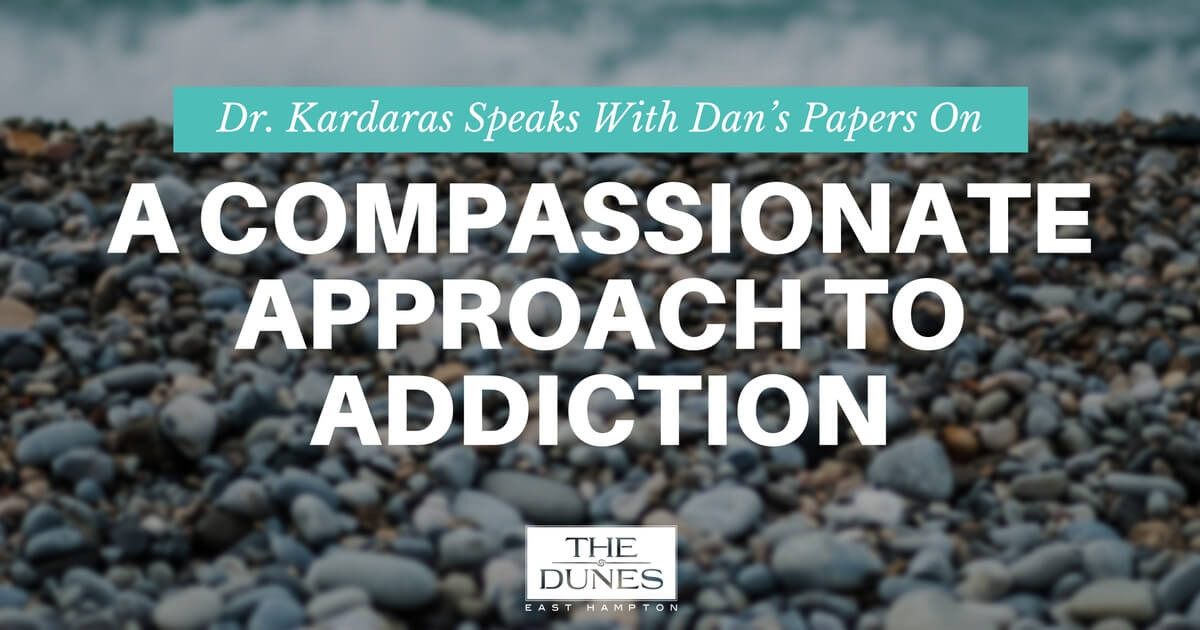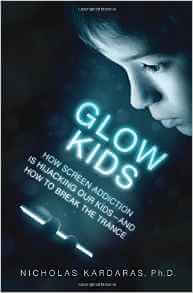

Dr. Nicholas Kardaras of The Dunes East Hampton is an expert on taking a compassionate approach to addiction, especially addiction to screen time. His new book “Glow Kids” addresses breaking screen addiction and is available on Amazon. Dr. Kardaras also has given several interviews on how to break the cycle of addiction. He recently had the opportunity to write about his compassionate approach to addiction treatment in a guest article for Dan’s Papers, an online publication for the Hamptons.
Dr. Kardaras’ Dan’s Papers Article
Who Is Dr. Nicholas Kardaras?

Dr. Kardaras is an Ivy League graduate and a clinical professor. His specialties include psychopathology, human behavior and addiction treatment. Dr. Kardaras is well-versed in the connection between stress and addiction. He often helps patients dealing with addiction and life transitions or spiritual crises.
What Is Meant By A Compassionate Approach To Addiction Treatment?
Some people might wonder if a compassionate approach to addiction means excusing the behavior. Dr. Kardaras says no. The key to a compassionate approach is understanding the root of the addiction. For example, Dr. Kardaras explains prescriptions for pain medication have tripled in the last 20 years. Yet, he questions whether the problem is pain itself or Americans’ intolerance of pain.
“I cannot in good conscience … accept the notion that we have three times more pain over the last 20 years,” he said in a recent HLN interview.
If Americans are less tolerant of pain than before, treatment for painkiller addiction must address that. Addicts need tools to recover from real pain, but must also be taught how to tolerate perceived pain. According to Dr. Kardaras, painkiller addicts use drugs as “lovers” and “crutches,” not as the cures they were intended to be. Addicts need guidance to identify perceived pain and receive emotional support from something other than a pill.
Additionally, a compassionate approach to addiction from painkillers deals with excuses.
“When we’re talking about higher-functioning addicts … their excuses are already built in,” Dr. Kardaras told HLN.
High-functioning addicts, such as those in white-collar jobs, know the consequences of their behavior better than lower-functioning addicts. They use those consequences as excuses to avoid treatment. Addicts “create stories” to keep themselves dependent on painkillers and other drugs because those stories are comfortable, Dr. Kardaras explains.
In his guest contribution to Dan’s Papers, Dr. Kardaras said it is vital to remember addicts are suffering.
“No one voluntarily chooses a self-destructive path,” he said.
Yet millions of people fall down addiction’s “rabbit hole” every day. Addictions cost these individuals their jobs and wreck relationships. Worse, addicts’ family members and friends can’t often see the depth of their suffering. They see “a never-ending series of behaviors” leading to increased self-destruction, Dr. Kardaras said. That’s often where punitive forms of treatment come in, but these push the addict further from recovery.
See The Full HLN Interview Here
What Will Help Addicts?
Many drug rehab facilities are what Dr. Kardaras calls “cookie cutter.” Some are hospital-like, institutional environments that leave addicts feeling isolated, angry or depressed. Such institutions don’t offer realistic support systems. Rather than teaching addicts to rebuild relationships, these facilities continue waging the “war on drugs.”
Yet, war will not solve the problem, Dr. Kardaras said. Whether you are addicted to drugs, alcohol, food or your computer screen, you cannot treat your addiction as the enemy. You must seek meaningful treatment that uncovers why you became addicted in the first place.
Addiction Treatment At The Dunes
At Dunes East Hampton, Dr. Kardaras and other staff members are privileged to offer such treatment. Methods include traditional psychotherapy, meditation and yoga. The Dunes’ clients also build a rapport with others through equine and other recreational therapies. They relearn responsibility through guided risks, caring for animals and supporting each other. Additionally, The Dunes offers family therapy, which helps clients’ loved ones fully understand addiction instead of hyper-focusing on addictive behaviors.
The Reality Of Screen Addiction
Recently, Dr. Kardaras has spoken extensively about teen internet and computer addiction. According to Kardaras, the internet is the biggest addiction today’s kids face. Perhaps more than drugs and alcohol, excessive internet and tech use penetrates the brain. It leads to anxiety, depression and increased distraction, which may worsen existing disorders such as ADD/ADHD.
In extreme cases, tech and video game addiction causes gaming-induced psychosis. After marathon sessions of internet use and violent gaming, kids and teens may suffer psychotic breaks. Such breaks lead to suicide attempts and even the murder, or attempted murder, of other people.
Dr. Kardaras warns us not to assume internet addicts were mentally ill from the start. He acknowledges people become addicted or psychotic without the internet or video games. Yet the level of brain penetration from technology is greater than most people believe. Internet addiction often feeds addictions to alcohol, painkillers and other drugs. Whether or not mental illness was or is a factor, young people with tech addictions need immediate treatment if they are going to recover.
Will A Compassionate Approach Help Screen Addicts?
Internet, video game and tech addicts need compassionate, individualized treatment. Because of their ages and the nature of their addictions, young tech addicts are more likely to be dismissed or punished. Parents sometimes believe forbidding computer and video game use will “cure” the addiction. However, this isolates the addict from his or her social network and makes treatment more difficult.
As with drug and alcohol addiction, Dr. Kardaras advocates multifaceted treatment for internet addicts. Treatment does involve “unplugging,” but avoids social isolation. Young internet addicts are given mind-body coping mechanisms. In specialized addiction treatment programs, they are encouraged to socialize through nature, art and equine therapy, and other therapeutic activities. This way, internet and video game addicts learn to effectively and constructively socialize without overstimulating virtual environments.
Contact The Dunes
If you or a loved one suffers from any addiction – whether drugs, alcohol or the internet – contact The Dunes East Hampton. You will have a chance to meet Dr. Kardaras and many other dedicated addiction treatment specialists who will focus on ending your suffering and getting your life back to normal.







